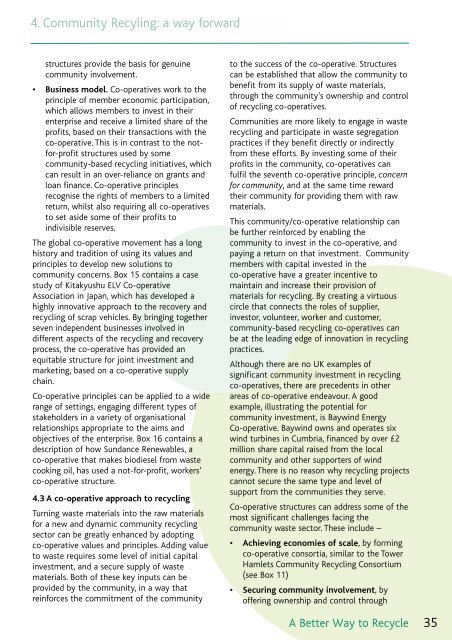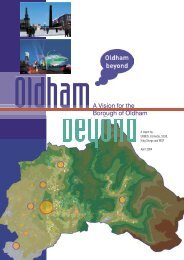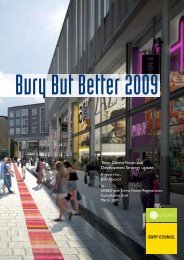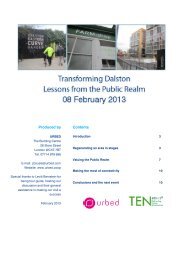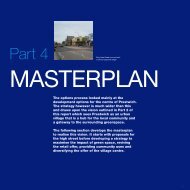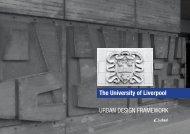A Better Way to Recycle: co-operative and community ... - Urbed
A Better Way to Recycle: co-operative and community ... - Urbed
A Better Way to Recycle: co-operative and community ... - Urbed
Create successful ePaper yourself
Turn your PDF publications into a flip-book with our unique Google optimized e-Paper software.
4. Community Recyling: a way forwardstructures provide the basis for genuine<strong>co</strong>mmunity involvement.• Business model. Co-<strong>operative</strong>s work <strong>to</strong> theprinciple of member e<strong>co</strong>nomic participation,which allows members <strong>to</strong> invest in theirenterprise <strong>and</strong> receive a limited share of theprofits, based on their transactions with the<strong>co</strong>-<strong>operative</strong>. This is in <strong>co</strong>ntrast <strong>to</strong> the notfor-profitstructures used by some<strong>co</strong>mmunity-based recycling initiatives, whichcan result in an over-reliance on grants <strong>and</strong>loan finance. Co-<strong>operative</strong> principlesre<strong>co</strong>gnise the rights of members <strong>to</strong> a limitedreturn, whilst also requiring all <strong>co</strong>-<strong>operative</strong>s<strong>to</strong> set aside some of their profits <strong>to</strong>indivisible reserves.The global <strong>co</strong>-<strong>operative</strong> movement has a longhis<strong>to</strong>ry <strong>and</strong> tradition of using its values <strong>and</strong>principles <strong>to</strong> develop new solutions <strong>to</strong><strong>co</strong>mmunity <strong>co</strong>ncerns. Box 15 <strong>co</strong>ntains a casestudy of Kitakyushu ELV Co-<strong>operative</strong>Association in Japan, which has developed ahighly innovative approach <strong>to</strong> the re<strong>co</strong>very <strong>and</strong>recycling of scrap vehicles. By bringing <strong>to</strong>getherseven independent businesses involved indifferent aspects of the recycling <strong>and</strong> re<strong>co</strong>veryprocess, the <strong>co</strong>-<strong>operative</strong> has provided anequitable structure for joint investment <strong>and</strong>marketing, based on a <strong>co</strong>-<strong>operative</strong> supplychain.Co-<strong>operative</strong> principles can be applied <strong>to</strong> a widerange of settings, engaging different types ofstakeholders in a variety of organisationalrelationships appropriate <strong>to</strong> the aims <strong>and</strong>objectives of the enterprise. Box 16 <strong>co</strong>ntains adescription of how Sundance Renewables, a<strong>co</strong>-<strong>operative</strong> that makes biodiesel from waste<strong>co</strong>oking oil, has used a not-for-profit, workers’<strong>co</strong>-<strong>operative</strong> structure.4.3 A <strong>co</strong>-<strong>operative</strong> approach <strong>to</strong> recyclingTurning waste materials in<strong>to</strong> the raw materialsfor a new <strong>and</strong> dynamic <strong>co</strong>mmunity recyclingsec<strong>to</strong>r can be greatly enhanced by adopting<strong>co</strong>-<strong>operative</strong> values <strong>and</strong> principles. Adding value<strong>to</strong> waste requires some level of initial capitalinvestment, <strong>and</strong> a secure supply of wastematerials. Both of these key inputs can beprovided by the <strong>co</strong>mmunity, in a way thatreinforces the <strong>co</strong>mmitment of the <strong>co</strong>mmunity<strong>to</strong> the success of the <strong>co</strong>-<strong>operative</strong>. Structurescan be established that allow the <strong>co</strong>mmunity <strong>to</strong>benefit from its supply of waste materials,through the <strong>co</strong>mmunity’s ownership <strong>and</strong> <strong>co</strong>ntrolof recycling <strong>co</strong>-<strong>operative</strong>s.Communities are more likely <strong>to</strong> engage in wasterecycling <strong>and</strong> participate in waste segregationpractices if they benefit directly or indirectlyfrom these efforts. By investing some of theirprofits in the <strong>co</strong>mmunity, <strong>co</strong>-<strong>operative</strong>s canfulfil the seventh <strong>co</strong>-<strong>operative</strong> principle, <strong>co</strong>ncernfor <strong>co</strong>mmunity, <strong>and</strong> at the same time rewardtheir <strong>co</strong>mmunity for providing them with rawmaterials.This <strong>co</strong>mmunity/<strong>co</strong>-<strong>operative</strong> relationship canbe further reinforced by enabling the<strong>co</strong>mmunity <strong>to</strong> invest in the <strong>co</strong>-<strong>operative</strong>, <strong>and</strong>paying a return on that investment. Communitymembers with capital invested in the<strong>co</strong>-<strong>operative</strong> have a greater incentive <strong>to</strong>maintain <strong>and</strong> increase their provision ofmaterials for recycling. By creating a virtuouscircle that <strong>co</strong>nnects the roles of supplier,inves<strong>to</strong>r, volunteer, worker <strong>and</strong> cus<strong>to</strong>mer,<strong>co</strong>mmunity-based recycling <strong>co</strong>-<strong>operative</strong>s canbe at the leading edge of innovation in recyclingpractices.Although there are no UK examples ofsignificant <strong>co</strong>mmunity investment in recycling<strong>co</strong>-<strong>operative</strong>s, there are precedents in otherareas of <strong>co</strong>-<strong>operative</strong> endeavour. A goodexample, illustrating the potential for<strong>co</strong>mmunity investment, is Baywind EnergyCo-<strong>operative</strong>. Baywind owns <strong>and</strong> operates sixwind turbines in Cumbria, financed by over £2million share capital raised from the local<strong>co</strong>mmunity <strong>and</strong> other supporters of windenergy. There is no reason why recycling projectscannot secure the same type <strong>and</strong> level ofsupport from the <strong>co</strong>mmunities they serve.Co-<strong>operative</strong> structures can address some of themost significant challenges facing the<strong>co</strong>mmunity waste sec<strong>to</strong>r. These include –• Achieving e<strong>co</strong>nomies of scale, by forming<strong>co</strong>-<strong>operative</strong> <strong>co</strong>nsortia, similar <strong>to</strong> the TowerHamlets Community Recycling Consortium(see Box 11)• Securing <strong>co</strong>mmunity involvement, byoffering ownership <strong>and</strong> <strong>co</strong>ntrol throughA <strong>Better</strong> <strong>Way</strong> <strong>to</strong> <strong>Recycle</strong> 35


